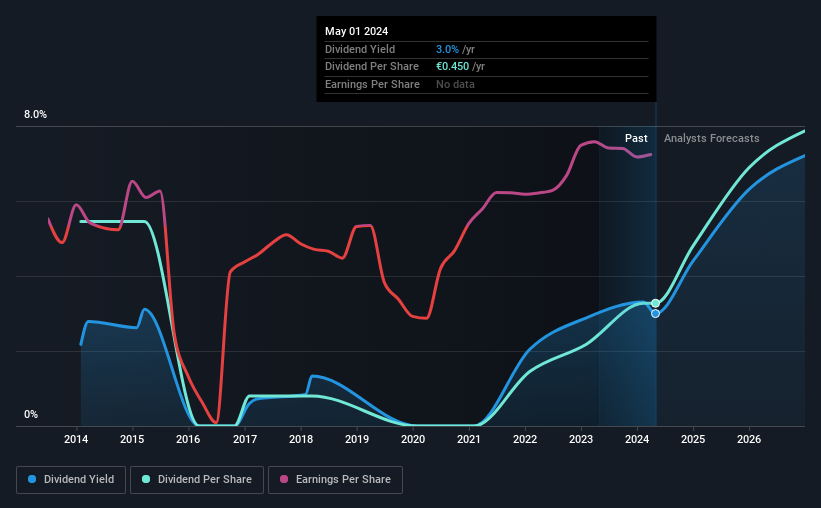
Deutsche Bank Aktiengesellschaft (ETR:DBK) has announced that it will be increasing its dividend from last year's comparable payment on the 21st of May to €0.45. This makes the dividend yield about the same as the industry average at 3.0%.
See our latest analysis for Deutsche Bank
Deutsche Bank's Payment Expected To Have Solid Earnings Coverage
While it is always good to see a solid dividend yield, we should also consider whether the payment is feasible.
Having distributed dividends for at least 10 years, Deutsche Bank has a long history of paying out a part of its earnings to shareholders. While past records don't necessarily translate into future results, the company's payout ratio of 21% also shows that Deutsche Bank is able to comfortably pay dividends.
Looking forward, EPS is forecast to rise by 26.2% over the next 3 years. The future payout ratio could be 38% over that time period, according to analyst estimates, which is a good look for the future of the dividend.

Dividend Volatility
The company's dividend history has been marked by instability, with at least one cut in the last 10 years. The dividend has gone from an annual total of €0.75 in 2014 to the most recent total annual payment of €0.45. This works out to be a decline of approximately 5.0% per year over that time. Generally, we don't like to see a dividend that has been declining over time as this can degrade shareholders' returns and indicate that the company may be running into problems.
The Dividend Looks Likely To Grow
Given that the dividend has been cut in the past, we need to check if earnings are growing and if that might lead to stronger dividends in the future. It's encouraging to see that Deutsche Bank has been growing its earnings per share at 170% a year over the past five years. Rapid earnings growth and a low payout ratio suggest this company has been effectively reinvesting in its business. Should that continue, this company could have a bright future.
We Really Like Deutsche Bank's Dividend
In summary, it is always positive to see the dividend being increased, and we are particularly pleased with its overall sustainability. The company is easily earning enough to cover its dividend payments and it is great to see that these earnings are being translated into cash flow. Taking this all into consideration, this looks like it could be a good dividend opportunity.
Companies possessing a stable dividend policy will likely enjoy greater investor interest than those suffering from a more inconsistent approach. At the same time, there are other factors our readers should be conscious of before pouring capital into a stock. Taking the debate a bit further, we've identified 1 warning sign for Deutsche Bank that investors need to be conscious of moving forward. Looking for more high-yielding dividend ideas? Try our collection of strong dividend payers.
If you're looking to trade Deutsche Bank, open an account with the lowest-cost platform trusted by professionals, Interactive Brokers.
With clients in over 200 countries and territories, and access to 160 markets, IBKR lets you trade stocks, options, futures, forex, bonds and funds from a single integrated account.
Enjoy no hidden fees, no account minimums, and FX conversion rates as low as 0.03%, far better than what most brokers offer.
Sponsored ContentNew: Manage All Your Stock Portfolios in One Place
We've created the ultimate portfolio companion for stock investors, and it's free.
• Connect an unlimited number of Portfolios and see your total in one currency
• Be alerted to new Warning Signs or Risks via email or mobile
• Track the Fair Value of your stocks
Have feedback on this article? Concerned about the content? Get in touch with us directly. Alternatively, email editorial-team (at) simplywallst.com.
This article by Simply Wall St is general in nature. We provide commentary based on historical data and analyst forecasts only using an unbiased methodology and our articles are not intended to be financial advice. It does not constitute a recommendation to buy or sell any stock, and does not take account of your objectives, or your financial situation. We aim to bring you long-term focused analysis driven by fundamental data. Note that our analysis may not factor in the latest price-sensitive company announcements or qualitative material. Simply Wall St has no position in any stocks mentioned.
About XTRA:DBK
Deutsche Bank
A stock corporation, provides corporate and investment banking, private clients, and asset management products and services in Germany, the United Kingdom, rest of Europe, the Middle East, Africa, the Americas, and the Asia-Pacific.
Undervalued with adequate balance sheet.
Market Insights
Community Narratives



